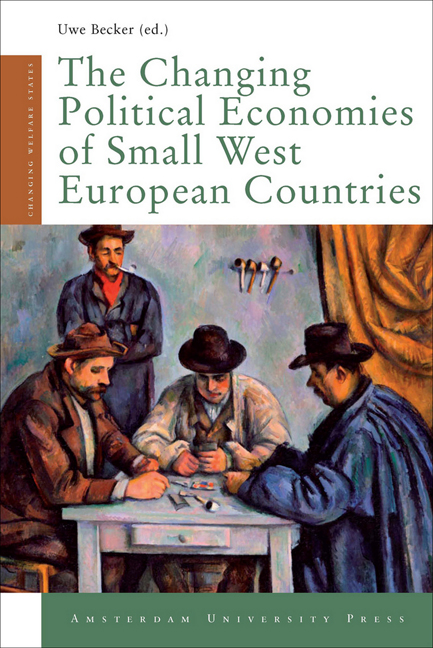Book contents
- Frontmatter
- Contents
- Preface and Acknowledgements
- 1 Introduction
- 2 The Variety of Capitalism in Sweden and Finland: Continuity Through Change
- 3 Change and Continuity in Danish and Norwegian Capitalism: Corporatism and Beyond
- 4 Coming Together But Staying Apart: Continuity and Change in the Austrian and Swiss Varieties of Capitalism
- 5 Liberal Convergence, Growing Outcome Divergence? Institutional Continuity and Changing Trajectories in the ‘Low Countries’
- 6 Small Countries, Big Countries under Conditions of Europeanisation and Globalisation
- 7 The Small Corporatist Political Economies as European Socio-Economic Model?
- About the Authors
- Bibliography
- Index
- Changing Welfare States
2 - The Variety of Capitalism in Sweden and Finland: Continuity Through Change
Published online by Cambridge University Press: 28 January 2021
- Frontmatter
- Contents
- Preface and Acknowledgements
- 1 Introduction
- 2 The Variety of Capitalism in Sweden and Finland: Continuity Through Change
- 3 Change and Continuity in Danish and Norwegian Capitalism: Corporatism and Beyond
- 4 Coming Together But Staying Apart: Continuity and Change in the Austrian and Swiss Varieties of Capitalism
- 5 Liberal Convergence, Growing Outcome Divergence? Institutional Continuity and Changing Trajectories in the ‘Low Countries’
- 6 Small Countries, Big Countries under Conditions of Europeanisation and Globalisation
- 7 The Small Corporatist Political Economies as European Socio-Economic Model?
- About the Authors
- Bibliography
- Index
- Changing Welfare States
Summary
In recent years, partly spurred by the failure of the globalisation thesis predicting rapid institutional and political convergence across countries (e.g. Lash & Urry 1987), we have witnessed an increased interest among comparative political economists in the distinctiveness and performance of various national economic systems. The extensive literature on the “varieties of capitalism” that has evolved over the last decade provides a particularly prominent example of this current trend (Hall & Soskice 2001, Hancké et al. 2008).
Traditionally, the Varieties of Capitalism approach (VoC) holds that developed industrialised economies cluster into two distinct groups labelled Coordinated Market Economies and Liberal Market Economies (CMEs and LMEs). In most writings on the topic, these two varieties of capitalism are pictured as stable and durable equilibriums to a set of coordination problems facing economic actors in various spheres of the economy.
This account of contemporary capitalism has, however, been criticised on typological as well as more substantive grounds. First, a number of authors have argued that the liberal-coordinated dichotomy of the VoC approach does not adequately cover the fundamental differences existing in capitalist economies. For instance, in the introductory chapter of this book Uwe Becker argues that we are better advised to distinguish between five, rather than two, distinct ideal types of capitalism (see also Becker 2009). More precisely, Becker suggests that we draw a distinction between capitalism of the liberal type on the one hand, and four distinct forms of coordinated or embedded capitalism on the other hand – i.e., statist, corporatist, patrimonial and meso-communitarian.
Second, and of particular relevance for the present chapter, the VoC approach has been criticised for exaggerating the extent of institutional stability in many countries by portraying non-market coordination as a thing some countries have and others lack, when in reality, “coordination is a political process, and an outcome, that has to be actively sustained and nurtured” (Thelen 2001: 73). That is, every now and then we should expect important political and economic actors to assess whether the coordination practices inherent in the present national capitalist system actually serve their interests. interests. And to the extent that this is not the case, we should expect these actors to try to change the institutional framework in a way that furthers their respective interests (Lindgren 2006; Hall & Thelen 2009).
- Type
- Chapter
- Information
- Publisher: Amsterdam University PressPrint publication year: 2012

